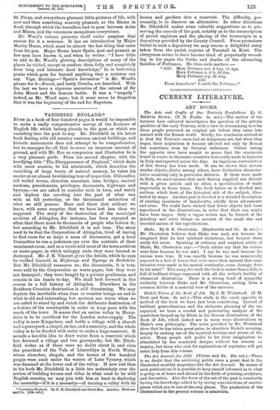VANISHING ENGLAND.*
EVEN in a book of four hundred pages it would be impossible to make a really comprehensive survey of the features of English life which belong already to the past, or which are vanishing into the past to-day. Mr. Ditchfield in his latest book dealing with old country customs, ancient buildings, and historic monuments does not attempt to be comprehensive, but he manages for all that to cover an immense amount of ground, and with Mr. Roe as companion and illustrator he is a very pleasant guide. From his second chapter, with the terrifying title "The Disappearance of England," which deals with coast erosion, to his nineteenth, which describes the vanishing of large tracts of natural scenery, he takes his reader on an almost bewildering tour of inspection. Old castles, old walled towns, churches, mansions, inns, bridges, ancient customs, punishments, privileges, documents, highways and byways,—we are asked to consider each in turn, and watch and deplore the receding into the past of what was with us till yesterday, or the threatened extinction of what we still possess. Here and there (but seldom) we learn, with some surprise, that we have lost less than we supposed. The story of the destruction of the municipal archives of Abingdon, for instance, has been repeated so often that there must be thousands of people who believe it; but according to Mr. Ditchfield it is not true. The story used to be that the Corporation of Abingdon, tired of having to find room for so large a mass of documents, got a local Committee to run a judicious eye over the contents of their muniment-room, and as a result sold most of the town archives as waste-paper, in which unhappy state they were burned or destroyed. Mr. J. E. Vincent gives the details, which he says he verified himself, in Highways and Byways in Berkshire. But Mr. Ditchfield reassures us ; the documents, it is true, were sold by the Corporation as waste-paper, but they were not destroyed ; they were bought by a private gentleman, and remain in his hands to-day. We shall look forward in due course to a full history of Abingdon. Elsewhere in the Southern Counties destruction is still threatening. We may deplore the inevitable when time or weather brings an end to what is old and interesting, but matters are worse when we are asked to stand by and watch the deliberate destruction of a feature of the countryside in order to keep pace with the needs of the town. It seems that an entire valley in Hamp- shire is to be sacrificed for the London water-supply. The valley is near Kingsclere, and holds a village with a church and a graveyard, a chapel, an inn, and a cemetery, and the whole valley is to be flooded with water to make a huge reservoir. It sounds a horrible idea to draw water from a reservoir which has drowned a village and two graveyards ; but Mr. Ditch- field writes as if there were no doubt about it, and cites the precedent of the Vale of Llanwddyn in North Wales, where churches, chapels, and the homes of five hundred people were sunk under the waters of Lake Vyrnwy, which was dammed at the lower end of the valley. If now and then in his book Mr. Ditehfield is a little too melancholy over the notion of building houses and villas in what used to be wild English country, we may join with him at least in deploring the necessity—if it is a necessity—of turning a valley with its * Vanishing England. By P. H. Litchfield and Fred Hoe. London: Methuen and Co. 115a nab.)
homes and gardens into a reservoir. The difficulty, pre- sumably, is to discover an alternative. In other directions Mr. Ditchfield makes some valuable suggestions as to pre- serving the records of the past, notably as to the transcription of parish registers and the placing of the transcripts in a depository provided by the County Council. From premature burial in such a depository we may rescue a delightful entry taken from the parish register of Tunstall in Kent. The clergyman seems to have become tired of perpetually record- ing in his pages the births and deaths of the abounding families of Pottmans. He thus ends matters :—
"1557. Mary Pottman nat. & bap. 15 Apr.
Mary Pottman n. & b. 29 Jan.
Mary Pottman sep. 22 Aug.
1567 From henceforwd I omitt the Pottmans."






















































 Previous page
Previous page